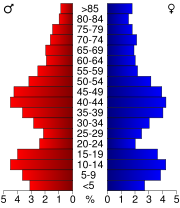
Houston County, Minnesota
Encyclopedia

Census
A census is the procedure of systematically acquiring and recording information about the members of a given population. It is a regularly occurring and official count of a particular population. The term is used mostly in connection with national population and housing censuses; other common...
of 2000, there were 19,718 people, 7,633 households, and 5,411 families residing in the county. The population density
Population density
Population density is a measurement of population per unit area or unit volume. It is frequently applied to living organisms, and particularly to humans...
was 35 people per square mile (14/km²). There were 8,168 housing units at an average density of 15 per square mile (6/km²). The racial makeup of the county was 98.47% White
Race (United States Census)
Race and ethnicity in the United States Census, as defined by the Federal Office of Management and Budget and the United States Census Bureau, are self-identification data items in which residents choose the race or races with which they most closely identify, and indicate whether or not they are...
, 0.31% Black
Race (United States Census)
Race and ethnicity in the United States Census, as defined by the Federal Office of Management and Budget and the United States Census Bureau, are self-identification data items in which residents choose the race or races with which they most closely identify, and indicate whether or not they are...
or African American
Race (United States Census)
Race and ethnicity in the United States Census, as defined by the Federal Office of Management and Budget and the United States Census Bureau, are self-identification data items in which residents choose the race or races with which they most closely identify, and indicate whether or not they are...
, 0.18% Native American
Race (United States Census)
Race and ethnicity in the United States Census, as defined by the Federal Office of Management and Budget and the United States Census Bureau, are self-identification data items in which residents choose the race or races with which they most closely identify, and indicate whether or not they are...
, 0.37% Asian
Race (United States Census)
Race and ethnicity in the United States Census, as defined by the Federal Office of Management and Budget and the United States Census Bureau, are self-identification data items in which residents choose the race or races with which they most closely identify, and indicate whether or not they are...
, 0.02% Pacific Islander
Race (United States Census)
Race and ethnicity in the United States Census, as defined by the Federal Office of Management and Budget and the United States Census Bureau, are self-identification data items in which residents choose the race or races with which they most closely identify, and indicate whether or not they are...
, 0.14% from other races
Race (United States Census)
Race and ethnicity in the United States Census, as defined by the Federal Office of Management and Budget and the United States Census Bureau, are self-identification data items in which residents choose the race or races with which they most closely identify, and indicate whether or not they are...
, and 0.51% from two or more races. 0.61% of the population were Hispanic
Race (United States Census)
Race and ethnicity in the United States Census, as defined by the Federal Office of Management and Budget and the United States Census Bureau, are self-identification data items in which residents choose the race or races with which they most closely identify, and indicate whether or not they are...
or Latino
Race (United States Census)
Race and ethnicity in the United States Census, as defined by the Federal Office of Management and Budget and the United States Census Bureau, are self-identification data items in which residents choose the race or races with which they most closely identify, and indicate whether or not they are...
of any race. 43.1% were of German, 29.6% Norwegian and 7.5% Irish
Irish people
The Irish people are an ethnic group who originate in Ireland, an island in northwestern Europe. Ireland has been populated for around 9,000 years , with the Irish people's earliest ancestors recorded having legends of being descended from groups such as the Nemedians, Fomorians, Fir Bolg, Tuatha...
ancestry according to Census 2000.
There were 7,633 households out of which 34.4% had children under the age of 18 living with them, 60.0% were married couples
Marriage
Marriage is a social union or legal contract between people that creates kinship. It is an institution in which interpersonal relationships, usually intimate and sexual, are acknowledged in a variety of ways, depending on the culture or subculture in which it is found...
living together, 7.4% had a female householder with no husband present, and 29.1% were non-families. 25.4% of all households were made up of individuals and 12.0% had someone living alone who was 65 years of age or older. The average household size was 2.53 and the average family size was 3.05.
In the county the population was spread out with 27.2% under the age of 18, 6.8% from 18 to 24, 26.8% from 25 to 44, 23.1% from 45 to 64, and 16.0% who were 65 years of age or older. The median age was 39 years. For every 100 females there were 97.5 males. For every 100 females age 18 and over, there were 95.1 males.
The median income for a household in the county was $40,680, and the median income for a family was $49,196. Males had a median income of $32,557 versus $22,158 for females. The per capita income
Per capita income
Per capita income or income per person is a measure of mean income within an economic aggregate, such as a country or city. It is calculated by taking a measure of all sources of income in the aggregate and dividing it by the total population...
for the county was $18,826. About 4.2% of families and 6.5% of the population were below the poverty line, including 6.4% of those under age 18 and 11.2% of those age 65 or over.
Cities and towns

| Cities | Townships | Unincorporated | |
|---|---|---|---|
|
|
|
Bee, Minnesota Bee is an unincorporated community in Houston County, Minnesota. It is located at the junction of Bee Hill Drive and Oakland Drive. First named Bergen, the community had a post office between 1891 and 1905.- External links :****... Reno, Minnesota Reno is an unincorporated community in Houston County, Minnesota, United States.The community is located between La Crescent, Minnesota and New Albin, Iowa on Minnesota State Highway 26.Reno is located at the junction of Highway 26 and County Road 249.... |
† a small part of La Crescent's area extends into Winona County
Winona County, Minnesota
As of the census of 2000, there were 49,985 people, 18,744 households, and 11,696 families residing in the county. The population density was 80 people per square mile . There were 19,551 housing units at an average density of 31 per square mile...
Sheriffs
- Matthew Williams 1854–1858 5 years
- Edmund Kelly 1859–1860 2 years
- W.W. Willis 1861–1864 4 years
- J.G. Prentise 1865–1866 2 years
- R.F. Judd 1867–1870 4 years
- John Phelps 1871–1872 2 years
- S.W. Walker 1873–1874 2 years
- Mark Hargreaves 1875–1878 4 years
- Walter Goergen 1879–1886 8 years
- George C. Drawley 1887–1892 6 years
- George N. Blexrud 1893–1900 8 years
- F.H. Evens 1901–1902 2 years
- Jacob Johnson 1903–1906 4 years
- C.K. Blexrud 1907–1912 6 years
- H.J.Blexrud 1913-died in office after 6 months
- George N.Blexrud 1913–1918 5½ years
- W.E. Abbots 1919–1926 8 years
- Arthur Brown 1927–1938 12 years
- Walter Goergen 1939-died in office after 1 month
- George V. Kelly 1939–1946 7 years 11 months
- Beryl Kerrigan 1947–1958 12 years
- Byron Whitehouse 1959–1970 12 years
- Jerry T. Olson 1971–1978 8 years
- Dennis L. Swedberg 1979–1994 16 years
- Michael C. Lee 1995-Oct 31,2005 10 years 10 months
- Darryl Peterson Nov 1,2005–2006 14 months
- Douglas Ely 2007-?
See also
- National Register of Historic Places listings in Houston County, Minnesota
- Upper Mississippi River National Wildlife and Fish RefugeUpper Mississippi River National Wildlife and Fish RefugeThe Upper Mississippi River National Wildlife and Fish Refuge is a . 261 river mile long National Wildlife Refuge located in and along the Upper Mississippi River. It runs from Wabasha, Minnesota in the north to Rock Island, Illinois in the south....

